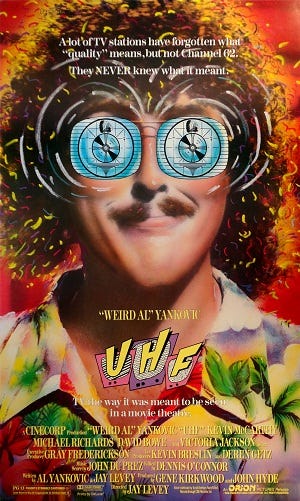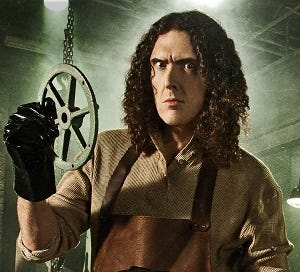Weird Al Yankovic, "UHF"

In the 1980s and through the 1990s it was said that a musical act knew they had "made it" when Weird Al Yankovic parodied one of their songs. Long one of my favorite artists, his brand of song parody is one of the more memorable aspects of my childhood, and I consider him one of my 80s idols.
Weird Al's 1989 feature film "UHF," a tale of a low-rent television station that becomes a runaway success due to its madcap guerrila programming, wasn't a huge box office success, but it has more than earned its place as a cult classic and remains a favorite of mine to this day.
Weird Al never stopped skewering pop culture through the 90s and continues the tradition today, with his album "Alpocalypse" featuring parodies of hits by Lady Gaga, Taylor Swift and Miley Cyrus among others, and though I haven't actively listened to his music for many years, I found myself laughing again as I introduced it to my kids in preparation for this interview.
Yankovic will host a 25th anniversary screening of "UHF" at Lafayette, Ind.'s Eastside 9 on Wednesday, Oct. 9, then will play a concert at Purdue's Elliott Hall of Music on Oct. 11.
Below is my interview with Yankovic, one of the few times in my career where I truly geek out over someone I interviewed. I didn't think it would be appropriate to edit out those bits of hero worship, so forgive me for including them.
Let me say first, and I apologize, because I have to be that guy, you were completely my idol when I was a kid, so thank you. I was really excited about doing the interview, and I had to say that.
Well thank you.
But that’s going to be my first question. I’m sure you hear that all the time.
Well, not from you.
Well, yeah, not from me. (laughs) Is it weird for someone to say that to you?
It is always a little strange, but of course it’s very flattering. How can it not make me feel great?
Let’s start with “UHF.” Where did that idea come from? You were doing music, then suddenly here is this movie coming out.
We’re going back a ways, so I’m reaching into the depths of my memory here, but I think it started fairly early on in my career. My first album came out in ’83, and ’84 is sorta when everything hit big. ’84 was “Eat It” and ’85 was “Like a Surgeon.” My ’85 my manager Jay Levey and I started writing a screenplay, which wound up being “UHF.” We wrote most of it that year, and it basically took a couple of years to find someone to make it. We’d been shopping it around Hollywood for awhile and knocking on a lot of doors, and ultimately we were able to find partners in Gene Kirkwood and Gray Frederickson and Orion Pictures signed on and we were able to shoot it in ’88 and it came out in ’89.

Can you talk about the process of making it? It sounds like the script took a lot of turns. Once you started making the movie, did you throw a lot of things around, and see what worked and what didn’t?
Well, Jay and I wrote the script, and we felt very attached to what we had written, so we shot it pretty close to script, although we left some holes when we cast Michael Richards, because we wanted to leave him some room for improv. There were definitely some places in the script where we basically added filler because we knew Michael Richards would add something much better, and he did. So there wasn’t a lot of spontaneous improv on the set, although we did have to make some changes because one of our cast members actually died during shooting. Trinidad Silva was killed by a drunk driver actually during production, and he was going to be in the movie a bit more than he wound up being. Things like that always happen that you’re not expecting, and you have to make changes on the spot.
The one bit from the movie I wanted to ask about is the firehose. Was that in the script, or was that a Michael Richards addition?
Oh, no, no, that’s not the sort of thing where you show up and say, “I wish we had a firehose!” That was very planned out. It was something I’d written way back when. I actually got to see the kid who got hit by the firehose. We did a 25th Anniversary reunion in Tulsa last week, and I got to see the kid, who is now in his 30s. That was kind of odd for me. It’s fun that the people of Tulsa have embraced the movie and feel like they’re a part of it, and they are.
“UHF” got a PG-13 rating. Most of the humor is relatively tame, as I recall, and you decided not to cut the film. Were you making a statement?
Yeah, and not because I wanted a PG-13, it’s because I didn’t want to lose the gags. The two things they wanted cut were first of all the throwing the poodles out the window, which is sick and dark and twisted, but I loved that. And also, Emo Phillips, the shop teacher, getting his thumb cut off, which was the whole gag of that bit, and I wasn’t about to lose Emo Phillips. I kind of put my foot down, and I don’t know if it hurt the film at all, I just really didn’t want to lose those gags.

Let’s talk about your music. In a larger context about what do you do? What is it that’s so funny about taking these popular songs and spoofing them? Then I realized so much of it is inherently ridiculous to start with. Is that some of what you go for when you’re writing?
There’s always something to make fun of in pop culture. It’s not like you run out of source material. Sometimes it does seem a little bit redundant to make fun of it, because it’s already pretty out there. When I decided to do a Lady Gaga parody that was a major problem for me. How do I make this even more bizarre than it already is? That’s part of the challenge of what I do.
I like where you went with that, too. This “By the way, this is totally an act.”
Well, “The Atlantic” actually said Lady Gaga’s new video is a parody of my parody, and she’s now trying to one-up what I did.
The incident with Coolio over “Gangster’s Paradise,” where he gave permission in private, but in public he claimed he never gave permission: have you spoken to him since then, or has it ever been addressed?
Well, I ran into him personally at some kind of trade show, and I was signing pictures and he came up to me, and I wondered if we were going to have some kind of problem (laughs). And he gave me a big hug, and everything is fine and it’s water under the bridge. I saw a video on YouTube where he was doing a Q&A session, and he said it was a big mistake on his part to make such a big deal about “Amish Paradise.” I really to this day have no idea what happened back in 1996 with that. I was told by my record label that everything had been cleared. At the time he contended the opposite. I’m very sorry for the miscommunication and if it caused him any pain at the time, but it’s certainly old news at this point and he’s calmed down.
I completely thought he was just playing to his audience, being a hard-edged rapper and can’t look like he has a sense of humor…
I can’t respond to that ‘cause I don’t really know what happened. (laughs)
I think we need to stop here, because if not this will turn into “The Chris Farley Show.”
(Laughs) Yeah right.
Thank you very much, both for the interview and for years of laughs.
Well thank YOU. I appreciate that.


